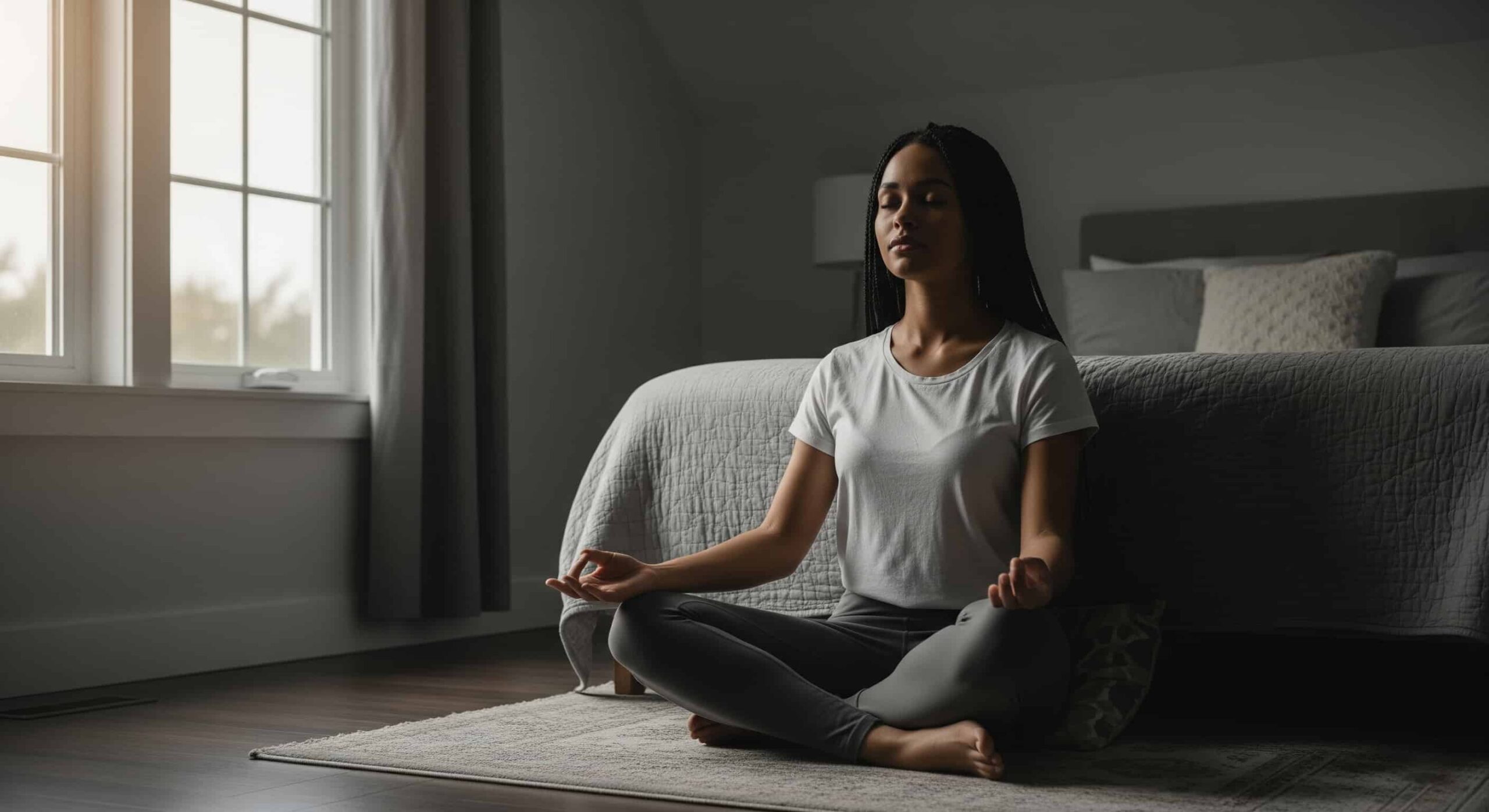In our fast-paced, always-connected world, achieving peaceful sleep can feel like an impossible dream. Racing thoughts, daily stress, and anxiety often follow us to bed, making it difficult to transition from the busyness of day to the calm of night. Meditation and mindfulness offer powerful, natural solutions to this modern sleep challenge. These ancient practices, backed by contemporary science, can help quiet your mind, relax your body, and create the perfect conditions for deep, restorative sleep.
The Science Behind Meditation and Sleep
Understanding how meditation affects your sleep can help you appreciate its power and motivate consistent practice.
How Meditation Improves Sleep Quality
- Activates the Relaxation Response: Meditation triggers the parasympathetic nervous system, reducing stress hormones like cortisol and adrenaline
- Reduces Mental Chatter: Regular practice helps quiet the "monkey mind" that often keeps us awake with worries and to-do lists
- Lowers Heart Rate and Blood Pressure: Physical relaxation naturally follows mental calm, preparing your body for sleep
- Increases Melatonin Production: Some studies suggest meditation may boost natural melatonin levels
- Improves Sleep Architecture: Research shows meditation can increase deep sleep stages and reduce sleep fragmentation
Research-Backed Benefits
- Faster Sleep Onset: Studies show meditation can reduce the time it takes to fall asleep by 50%
- Improved Sleep Quality: Practitioners report feeling more rested and refreshed upon waking
- Reduced Sleep Disturbances: Less frequent nighttime awakenings and easier return to sleep
- Decreased Insomnia Symptoms: Significant improvements in chronic insomnia after 6-8 weeks of practice
- Enhanced Daytime Functioning: Better mood, concentration, and energy levels during the day
The Mindfulness-Sleep Connection
Mindfulness teaches us to observe our thoughts and feelings without judgment, creating space between ourselves and our worries. This skill is particularly valuable at bedtime when anxiety about sleep itself can become a barrier to rest. By practicing mindful awareness, we learn to:
- Accept the present moment without resistance
- Observe racing thoughts without getting caught up in them
- Release the need to control or force sleep
- Cultivate a sense of peace and acceptance
Essential Meditation Techniques for Better Sleep
These proven meditation practices are specifically designed to prepare your mind and body for restful sleep.
Body Scan Meditation
This technique systematically relaxes every part of your body while cultivating mindful awareness.
How to Practice:
- Lie comfortably in bed with your eyes closed
- Begin by taking three deep, slow breaths
- Start at the top of your head and slowly move your attention down through your body
- Notice each body part without trying to change anything—just observe
- If you notice tension, breathe into that area and allow it to soften
- Continue until you've scanned your entire body from head to toes
- End by taking a few moments to feel your whole body at once
Benefits: Releases physical tension, increases body awareness, and naturally leads to relaxation and sleep.
Breathing Meditation
Focused breathing is one of the most accessible and effective meditation techniques for sleep.
4-7-8 Breathing Technique:
- Exhale completely through your mouth
- Close your mouth and inhale through your nose for 4 counts
- Hold your breath for 7 counts
- Exhale through your mouth for 8 counts
- Repeat the cycle 3-4 times
Natural Breath Awareness:
- Simply observe your natural breathing rhythm
- Notice the sensation of air entering and leaving your nostrils
- When your mind wanders, gently return attention to your breath
- Continue until you drift off to sleep
Loving-Kindness Meditation
This practice cultivates feelings of warmth, compassion, and peace—perfect for bedtime.
How to Practice:
- Begin by sending loving wishes to yourself: "May I be peaceful, may I be happy, may I sleep well"
- Extend these wishes to loved ones: "May you be peaceful, may you be happy, may you sleep well"
- Include neutral people in your life
- If comfortable, extend wishes to difficult people
- Finally, send loving-kindness to all beings everywhere
Benefits: Reduces anxiety, promotes emotional well-being, and creates a positive mindset for sleep.
Visualization Meditation
Using mental imagery to create peaceful, calming scenes that promote relaxation.
Peaceful Place Visualization:
- Imagine a place where you feel completely safe and peaceful
- Engage all your senses—what do you see, hear, smell, and feel?
- Spend time exploring this peaceful environment in your mind
- Allow yourself to feel the deep relaxation this place brings
Progressive Relaxation Imagery:
- Visualize warm, golden light slowly moving through your body
- Imagine this light melting away tension and stress
- See yourself becoming heavier and more relaxed with each breath
- Picture yourself drifting peacefully into sleep
Mantra Meditation
Repeating calming words or phrases to focus the mind and promote relaxation.
Effective Sleep Mantras:
- "I am peaceful and calm"
- "With each breath, I release the day"
- "I trust in my body's wisdom to sleep"
- "Peace flows through me"
- "I am safe and can rest"
How to Practice:
- Choose a mantra that resonates with you
- Repeat it silently in rhythm with your breathing
- When your mind wanders, gently return to your mantra
- Allow the words to become softer and more distant as you relax
Mindfulness Practices for Sleep
Mindfulness extends beyond formal meditation to include awareness practices that can be integrated throughout your evening routine.
Mindful Evening Routine
Transform your bedtime preparation into a mindfulness practice.
- Mindful Hygiene: Pay full attention to brushing your teeth, washing your face, and other bedtime rituals
- Conscious Undressing: Notice the sensation of removing your clothes and putting on sleepwear
- Mindful Movement: Perform gentle stretches or yoga poses with full awareness
- Gratitude Practice: Reflect on three things you're grateful for from the day
- Intention Setting: Set a peaceful intention for your sleep and tomorrow
Mindful Transition to Sleep
Use mindfulness to ease the transition from wakefulness to sleep.
- Notice Without Judging: Observe thoughts and feelings that arise without labeling them as good or bad
- Accept What Is: Rather than fighting restlessness or worry, acknowledge it with kindness
- Return to the Present: When your mind drifts to tomorrow's tasks or yesterday's events, gently bring attention back to the present moment
- Embrace Uncertainty: Release the need to know exactly when you'll fall asleep
Dealing with Racing Thoughts
Mindfulness techniques for managing an overactive mind at bedtime.
- The RAIN Technique:
- Recognize: Notice that your mind is racing
- Allow: Let the thoughts be there without resistance
- Investigate: Observe the thoughts with curiosity, not judgment
- Non-attachment: Let thoughts come and go like clouds in the sky
- Mental Noting: Label thoughts as "thinking," "planning," or "worrying" and return to your breath
- The 5-4-3-2-1 Technique: Notice 5 things you can see, 4 you can touch, 3 you can hear, 2 you can smell, 1 you can taste
Building Your Personal Practice
Creating a sustainable meditation and mindfulness practice requires patience, consistency, and self-compassion.
Starting Your Practice
- Begin Small: Start with just 5-10 minutes of practice
- Choose One Technique: Master one method before exploring others
- Set Realistic Expectations: Progress takes time—be patient with yourself
- Create a Routine: Practice at the same time each night to build a habit
- Prepare Your Space: Create a calm, comfortable environment for practice
Overcoming Common Challenges
- "My mind is too busy": This is normal—the goal isn't to stop thoughts but to change your relationship with them
- "I fall asleep during meditation": This is actually a good sign that you're relaxing! It's perfectly fine
- "I don't have time": Even 3-5 minutes can be beneficial—quality matters more than quantity
- "I'm not doing it right": There's no perfect way—any moment of awareness is valuable
- "It's not working": Benefits often accumulate gradually—trust the process
Deepening Your Practice
- Gradually Increase Duration: Add 2-3 minutes to your practice each week
- Explore Different Techniques: Try various methods to find what works best for you
- Practice During the Day: Brief mindfulness moments throughout the day enhance nighttime practice
- Join a Community: Consider meditation groups or online communities for support
- Work with a Teacher: Guidance from an experienced instructor can accelerate your progress
Integrating Mindfulness into Daily Life
The benefits of meditation for sleep are enhanced when mindfulness becomes a way of life, not just a bedtime practice.
Daytime Mindfulness for Better Sleep
- Mindful Breathing Breaks: Take 3-5 conscious breaths several times throughout the day
- Stress Awareness: Notice stress as it arises and address it before it accumulates
- Mindful Eating: Pay attention to your meals, especially dinner, to aid digestion
- Technology Boundaries: Practice mindful consumption of news and social media
- Walking Meditation: Take mindful walks to clear your head and reduce stress
Creating a Sleep-Supportive Mindset
- Release the Day: Practice letting go of the day's events and emotions
- Cultivate Trust: Develop confidence in your body's natural ability to sleep
- Embrace Imperfection: Accept that some nights will be better than others
- Focus on Rest: Even if you don't sleep, rest and relaxation are valuable
- Morning Reflection: Notice how meditation affects your sleep quality over time
Resources and Tools
Enhance your practice with helpful resources and tools designed to support your meditation journey.
Recommended Apps and Audio
- Guided Meditation Apps: Headspace, Calm, Insight Timer, Ten Percent Happier
- Sleep-Specific Content: Look for "sleep stories," "bedtime meditations," and "body scans"
- Nature Sounds: Rain, ocean waves, forest sounds can enhance your practice
- Binaural Beats: Some find these helpful for deepening relaxation
- Podcasts: Sleep and meditation podcasts for ongoing learning and inspiration
Creating Your Sleep Sanctuary
- Comfortable Positioning: Use pillows and supports to find your ideal meditation posture
- Temperature Control: Keep your room cool and comfortable
- Lighting: Dim or eliminate lights; consider a salt lamp for gentle illumination
- Aromatherapy: Lavender, chamomile, or sandalwood can enhance relaxation
- Sound Environment: Use earplugs, white noise, or calming music as needed
Tracking Your Progress
- Sleep Journal: Note your practice and sleep quality each day
- Meditation Log: Track which techniques work best for you
- Mood Monitoring: Notice how your practice affects your overall well-being
- Weekly Reviews: Reflect on patterns and adjust your approach as needed
- Celebrate Progress: Acknowledge improvements, no matter how small
Your Journey to Peaceful Sleep
Meditation and mindfulness offer a gentle, natural path to better sleep that becomes more powerful with practice. Unlike quick fixes or sleep aids, these practices address the root causes of sleep difficulties while building skills that serve you for life.
Remember: Every moment of awareness, every conscious breath, and every practice session—no matter how brief—contributes to your overall well-being and sleep quality.
Be patient with yourself: Like learning any new skill, meditation takes time to develop. Some nights will be easier than others, and that's perfectly normal.
Start tonight: You don't need special equipment, perfect conditions, or extensive training. You can begin with just a few minutes of mindful breathing as you lie in bed.
Trust the process: Your body knows how to sleep—meditation simply helps remove the obstacles that prevent this natural process from occurring.
Sweet dreams await you on this journey of mindful awareness and peaceful rest.


